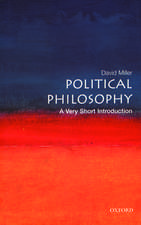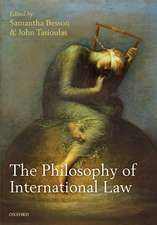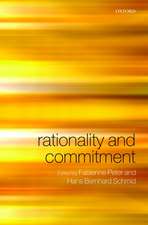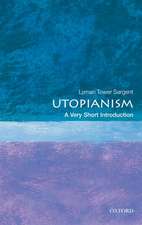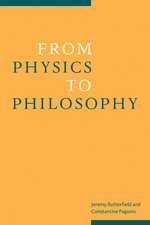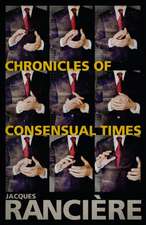Philosophy and Dissidence in Cold War Europe
Autor Aspen E. Brintonen Limba Engleză Hardback – 17 feb 2016
Brinton examines the ways Cold War dissidents in Central and Eastern Europe turned to the past for inspiration in order to change and transcend their present entrapment, contributing to a more general narrative about how to change one's way of acting by altering one's way of thinking. Ideas such as 'living in truth,' the 'parallel polis,' creating 'civil society,' and 'anti-political politics' allowed dissidents to survive totalitarianism, recreate their intellectual universe, and re-humanize themselves amidst dehumanizing political situations.
Our conversations about the relationship between philosophy, politics, and dissidence can be deepened by examining this legacy.
| Toate formatele și edițiile | Preț | Express |
|---|---|---|
| Paperback (1) | 384.48 lei 6-8 săpt. | |
| Palgrave Macmillan US – 31 mar 2018 | 384.48 lei 6-8 săpt. | |
| Hardback (1) | 390.63 lei 6-8 săpt. | |
| Palgrave Macmillan US – 17 feb 2016 | 390.63 lei 6-8 săpt. |
Preț: 390.63 lei
Nou
Puncte Express: 586
Preț estimativ în valută:
74.75€ • 81.45$ • 62.99£
74.75€ • 81.45$ • 62.99£
Carte tipărită la comandă
Livrare economică 23 aprilie-07 mai
Preluare comenzi: 021 569.72.76
Specificații
ISBN-13: 9781137576026
ISBN-10: 1137576022
Pagini: 267
Ilustrații: XV, 267 p.
Dimensiuni: 140 x 216 x 18 mm
Greutate: 0.48 kg
Ediția:1st ed. 2016
Editura: Palgrave Macmillan US
Colecția Palgrave Macmillan
Locul publicării:New York, United States
ISBN-10: 1137576022
Pagini: 267
Ilustrații: XV, 267 p.
Dimensiuni: 140 x 216 x 18 mm
Greutate: 0.48 kg
Ediția:1st ed. 2016
Editura: Palgrave Macmillan US
Colecția Palgrave Macmillan
Locul publicării:New York, United States
Cuprins
Prologue: Possibility Beyond Shadow Lines
Introduction
1. Horizons of the Dissident Life-World
2. Mutual Recognition in the Parallel Polis
3. Towards an Existential Recognition: The Self and Other in Dissidence
Conclusion: 'As if I were a dissident:' A Guide to Thinking and Action
Introduction
1. Horizons of the Dissident Life-World
2. Mutual Recognition in the Parallel Polis
3. Towards an Existential Recognition: The Self and Other in Dissidence
Conclusion: 'As if I were a dissident:' A Guide to Thinking and Action
Recenzii
'Brinton is an elegant writer with a talent for making lively connections between people, ideas, and events. Her book examines the roots of dissident thought in Central Europe and the continuing relevance of dissident ideas not only for historians but also for political philosophy generally and, more practically, for those engaged in struggles against tyranny.' - James F. Pontuso, Hampden-Sydney College, USA
Notă biografică
Aspen Brinton teaches courses on dissent, social responsibility, and international ethics in the Philosophy Department and International Studies Program at Boston College, USA. She has taught previously at the University of Pennsylvania, USA, Northwestern University in Qatar and Georgetown University, USA. She holds a PhD in Political Theory from Georgetown University.
Textul de pe ultima copertă
Central European dissidents gained global fame by serving as key protagonists in the collapse of communism in 1989. As writers, philosophers, and artists, they should be remembered for their ideas as much as for their political actions. This book takes the variegated and collected dissident oeuvre and reads their texts as expressions of their existential search for inter-subjective understanding and mutual recognition, showing how their ideas contribute to current conversations in political philosophy about thinking and action.
Brinton examines the ways Cold War dissidents in Central and Eastern Europe turned to the past for inspiration in order to change and transcend their present entrapment, contributing to a more general narrative about how to change one's way of acting by altering one's way of thinking. Ideas such as 'living in truth,' the 'parallel polis,' creating 'civil society,' and 'anti-political politics' allowed dissidents to survive totalitarianism, recreate their intellectual universe, and re-humanize themselves amidst dehumanizing political situations.
Our conversations about the relationship between philosophy, politics, and dissidence can be deepened by examining this legacy.
Brinton examines the ways Cold War dissidents in Central and Eastern Europe turned to the past for inspiration in order to change and transcend their present entrapment, contributing to a more general narrative about how to change one's way of acting by altering one's way of thinking. Ideas such as 'living in truth,' the 'parallel polis,' creating 'civil society,' and 'anti-political politics' allowed dissidents to survive totalitarianism, recreate their intellectual universe, and re-humanize themselves amidst dehumanizing political situations.
Our conversations about the relationship between philosophy, politics, and dissidence can be deepened by examining this legacy.

